罗托克中文说明书
上海罗托克自动化仪表 RDX 系列旋进旋涡流量计 说明书

■上海罗托克自动化仪表有限公司RDXRDX型智能旋进流量计一. 概述:当沿着轴向流动的流体进入流量传感器入口时,旋涡发生体强迫流体进行旋转运动,于是在旋涡发生体中心产生旋涡流,旋涡流在文丘利管中旋进,到达收缩段突然节流使旋涡流加速,当旋涡流进入扩散段,因回流作用强迫进行旋进式二次旋转。
此时旋涡流的旋转频率与介质流速成正比,并为线性。
两个压电传感器检测的微弱电荷信号经前置放大器差动放大、滤波、整形后变成两路频率与流速成正比的脉冲信号,同时处理电路对两路的脉冲信号进行相位比较和判别,剔除干扰信号,而对正常的流量信号进行计数处理。
图图1外观原理图二.特点:●采用独特的双传感器技术和电路处理技术,有效地解决了压力波动和机械振动对该类型流量计的干扰,计量准确可靠。
●集温度、压力、流量传感器和智能流量积算仪于一体,可对被测气体温度、压力和压缩因子自动跟踪修正,直接计量气体的标准体积流量和总量。
●补偿仪对天然气压缩因子的修正模型中,具有AGA NX-19与采用SGERG-88方程的两种方法可选。
●采用微功耗高新技术,凭内外电源均可工作,内电池可连续使用五年以上。
●无机械转动部件,高可靠,稳定性好,维修量少,对介质适应性好。
●大屏幕LCD显示标准体积流量、标准体积总量、温度、压力和电池容量,显示清晰直观,读数方便。
●功能强大,四种补偿方式、四种脉冲信号输出、三种历史数据记录方式、两种标准电流信号输出方式可选。
●可通过RS485接口组成电话通信网络和GPRS无线通信网络,安全可靠,可方便实现自动化管理。
RS485通信协议符合MODBUS协议。
●表头可180°随意旋转,安装方便。
●采用四通阀门设计,便于压力传感器的保护和在线对压力精度进行检定。
三.技术参数3.1主要参数 表 13.2 适用介质天然气、城市煤气、压缩空气、氮气、氧气(流量计须经脱脂工艺处理)、烷类及工业惰性气体等。
3.3 使用条件环境温度:-30℃~+60℃; 介质温度:-20℃~+80℃; 大气压力:70kPa ~106kPa ; 相对湿度:5%~95%。
罗托克IQ3完整中文调试手册
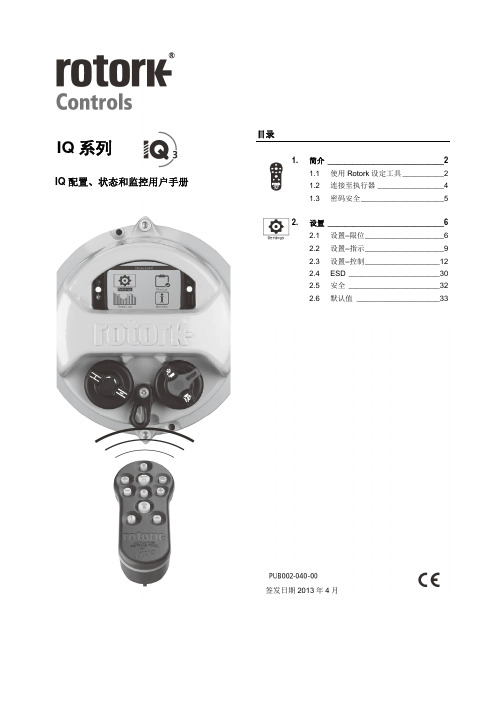
8.
键
9. 10.
11.
键
导航 要浏览屏幕、菜单和页面,使用 和 键。 按下一个键即会产生一次移动。 按住键将会产生连续多 次移动。菜单、页面和下拉菜单相互环绕。这就意味着可通 过按下顶部的 访问屏幕底部的项目。
简写说明 该手册使用简写说明(示例) : (是指选择、 编辑、设置、保存) ,提示用户所需的按键操作。显示屏也 将在底部左侧指示相关按键。
下面的示例显示了 Setting–Limit–Close Settings, 其中功能 Action 加亮显示:
要进行更改,按下
选择。
功能和其设置选项或范围将会加亮显示:
上海罗托克自动化仪表 RLDZ 智能型电磁流量计 说明书

RLDZ智能型电磁流量计使用说明书上海罗托克自动化仪表有限公司目录一、综述 (1)1.1概述 (1)1. 2测量原理 (1)二、技术数据 (2)2. 1 RLDZ的安装形式....................~.. (2)2. 2传感器参数 (2)2. 3电气参数 (2)2.4精度指标 (2)2. 5衬里材料、电极材料性能及适用范围 (2)2. 6外形尺寸与重量...........................~. (4)三、技术数据 (5)3. 1电路方框图 (5)3. 2工作原理 (5)四、安装...............................................,...~. (6)五、传感器接地 (7)六、运行与调试 (8)6. 1电源连接 (8)6. 2转换器与传感器连接 (8)6. 3调试程序 (8)6.4量程改变 (8)七、输出信号连接 (10)7. 1电流输出连接图..............., (10)八、维护和故障查找 (10)一、综述1.1概述──采用低频正负二值励磁电流和新型励磁电路,使整机功耗低于10V A。
──输出电流具有隔离功能,不需要附加隔离电流功能选择件(即不需要隔离板)。
──转换器线路板采用SMD器件贴片技术,结构紧凑坚固,安装使用方便,更适合于在振动条件较严峻的场合使用(如灌浆、泵压测量水泥浆工作环境等)。
──转换器线路板之间用扁平电缆连接,互换性强,装拆便利,量程变换与传感器配套简单,为调试使用带来很大方便)。
──流量计稳定性高,重复性好。
1.2测量原理测量原理是基于法拉第电磁感应定律。
即:导电液体在磁场中作切割磁力线运动时,导体中产生感应电压,其感应电压为:U=RLDZBvDRLDZ=仪表常数B=磁感应强度v=测量管截面内的平均流速D=测量管的内直径测量流量时,流体流过垂直于流动方向的磁场,导电性液体的流动感应出一个与平均流速(亦即体积流量)成正比的电压,因此要求被测的流动液体具有最低限度的电导率。
罗托克调节阀说明书
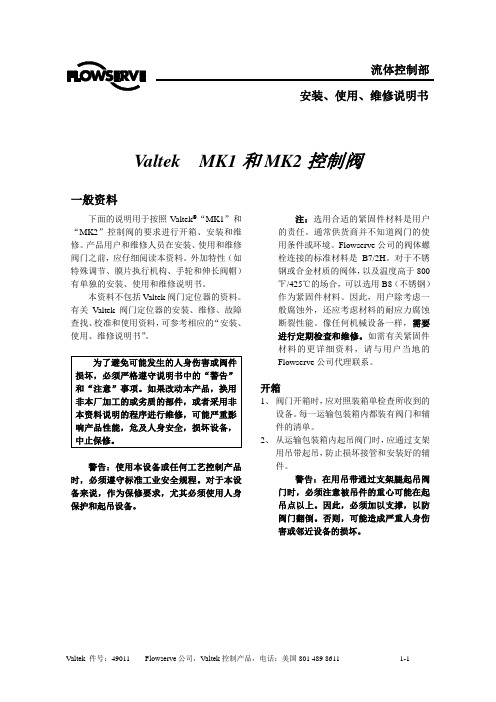
Valtek 件号:49011 Flowserve 公司,Valtek 控制产品,电话:美国801 489 8611 1-1流体控制部 安装、使用、维修说明书Valtek MK1和MK2控制阀一般资料下面的说明用于按照Valtek ®“MK1”和“MK2”控制阀的要求进行开箱、安装和维修。
产品用户和维修人员在安装、使用和维修阀门之前,应仔细阅读本资料。
外加特性(如特殊调节、膜片执行机构、手轮和伸长阀帽)有单独的安装、使用和维修说明书。
本资料不包括Valtek 阀门定位器的资料。
有关Valtek 阀门定位器的安装、维修、故障查找、校准和使用资料,可参考相应的“安装、使用、维修说明书”。
警告:使用本设备或任何工艺控制产品时,必须遵守标准工业安全规程。
对于本设备来说,作为保修要求,尤其必须使用人身保护和起吊设备。
注:选用合适的紧固件材料是用户的责任。
通常供货商并不知道阀门的使用条件或环境。
Flowserve 公司的阀体螺栓连接的标准材料是B7/2H 。
对于不锈钢或合金材质的阀体,以及温度高于800℉/425℃的场合,可以选用B8(不锈钢)作为紧固件材料。
因此,用户除考虑一般腐蚀外,还应考虑材料的耐应力腐蚀断裂性能。
像任何机械设备一样,需要进行定期检查和维修。
如需有关紧固件材料的更详细资料,请与用户当地的Flowserve 公司代理联系。
开箱1、 阀门开箱时,应对照装箱单检查所收到的设备。
每一运输包装箱内都装有阀门和辅件的清单。
2、 从运输包装箱内起吊阀门时,应通过支架用吊带起吊,防止损坏接管和安装好的辅件。
警告:在用吊带通过支架腿起吊阀门时,必须注意被吊件的重心可能在起吊点以上。
因此,必须加以支撑,以防阀门翻倒。
否则,可能造成严重人身伤害或邻近设备的损坏。
3、如发现运输损坏,应立即与运输公司联系。
4、有任何问题时,可与用户当地的Flowserve公司代理联系。
安装1、安装阀门前,应清除管路中的污垢、焊接碎屑、锈皮或其它杂物。
罗托克AQ系列E570C ROTORK 说明书
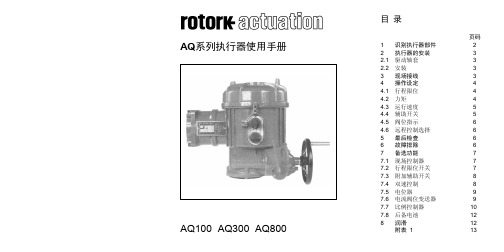
电路板
开
关
开关
ON
OFF
1 紧急保护 可使用 不可使用 选择
2 过热保护 旁路 不旁路
旁路
3 优先 1 两个都开为关优先
4 优先 2 两个都关为开优先
这些执行器的电气安装、维护与使 用 应 符 合 1908 年 和 1944 年 版 的 《电气生产厂家特殊条例》的要求, 以 及 第 十 五 版 IEE 接 线 标 准 指 南 。 因此用户应熟悉这些条例以及其它 有关安全使用这些设备的法定条 款。用户还应根据1974年版的《安 全与健康条例》来了解他们的职 责。
解决办法:增大力矩。
iii) 可能的原因:阀门卡塞。
解决办法:检查并打开阀门。
执行器运行,但不驱动阀门 手/自动切换手柄被锁定在手动位 置。
执行器不启动 检查并更换保险丝。
7 备选功能
(参考执行器接线图)
7.1 完整的现场控制器 (见图5)
这一部分由两个旋钮组成,一个是 具有开/关两位控制的选择器;另一 个是可以锁定的、具有现场/停止/远 程三个位置的选择器。 图 5
机械安装应按手册中的介绍,并根 据有关的《英国标准实施规程》来 进行。
如果执行器的铭牌上指示出该执行 器适合安装在危险气体区域,则适 用于如下条例。
这些执行器的电气安装、维护及使 用 应 根 据 1976 年 版 BS5345 的 第 一 部 分 和 1979 年 版 BS5345 的 第 三 部 分来进行。如果不符合这些标准中 提出的要求,则不负责检查和维 修。在无故障的情况下,不应对执 行器进行任何更改或改造,因为这 将使已经获得认证的标准失效。
罗托克电动头中文说明书
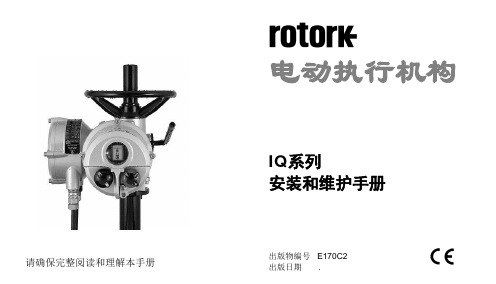
IQ10至IQ35
B型非推力底座
卸下底盘的四个螺栓,确保底盘的安全,卸下底盘。
此时可看到驱动轴套和卡簧。
B3和B4型的拆卸:
(参见图7a)
用外卡簧钳涨开卡簧,同时向外拉驱动轴套。驱动轴套将从
执行器中心套筒上脱开,但卡簧仍留在轴套的槽中。
图7a
B3和B4型的重新组装
润滑驱动轴套和卡簧。将卡簧装入驱动轴套的槽中,将驱动轴套送入执行器中心套筒底部,对准键和槽。
提升1
侧面安装
非提升杆式阀门-11
顶部安装
手轮密封11
IQM调节型执行器12
IQML线性推力装置12
IQML线性行程的调整12
6接线14
地线的连接14
端子箱盖的拆卸14
电缆入口14
端子的接线15
端子箱盖的复位15
7设定16
设定程序16
设定器17
进入设定程序18
如果需要进一步有关RotorkIQ系列执行器的资料和指南,我们将根据需要提供。
如果执行器不能立即安装,则应将它保存在一个干燥的地方,直到准备接线。
如果执行器已安装好,但还没有接线,那么建议您将电缆入口的塑料塞换成缠有聚四氟乙烯的密封金属塞。
如无意外,Rotork产品的双密封结构能很好地保护内部的电气元件。
图15上紧止挡圈的定位螺栓
IQ40至IQ95
B型非推力底座
B1型
输出轴的孔和键均符合ISO 5210标准。驱动轴套无需加工。
B3和B4型
此两种驱动轴套可根据顶部带帽的螺栓来鉴别。
B3在提供时已按ISO5210标准预加工。
B4在提供时为实心,需按阀门或齿轮箱的驱动轴进行加工。
IQ3说明书EN

PUB002-039-00 Date of issue 12/12Table of Contents1. Introduction _____________________________31.1 Identifying Actuator Parts (3)1.2 Rotork Setting Tool (4)1.3 Introduction to this manual (5)2. Health and Safety _______________________52.1 ATEX/IECFM Certified Actuators (6)3. Storage _________________________________64. Operating your IQ Actuator ______________74.1 Operating by Hand (7)4.2 Operating Electrically (7)4.3 Display - Local Indication (8)4.4 Display – Home screen selection (9)4.5 Display Status Indication – Travel (10)4.6 Display Status Indication – Control (10)4.7 Display Alarm Indication (10)4.8 Battery Alarm (10)5. Preparing the Drive Bush _______________115.1 IQ base all sizes types A and Z3 (11)5.2 Non-Thrust Base Type B (12)6. Mounting the Actuator ________________136.1 Rising Stem Valves Top Mounted (14)6.2 Valve with Gearbox – Side Mounting (14)6.3 Non-Rising Stem Valves – Top Mounting (14)6.4 Handwheel Sealing (15)6.5 IQM Modulating Actuators (15)6.6 IQL & IQML Linear Drive Unit (15)6.7 IQL & IQML Adjusting Linear Stroke (16)7. Cable Connections _____________________167.1 Terminal Block Layout (16)7.2 Earth/Ground Connections. . . . . . . . . . . . . . . . .177.3 Removing Terminal Cover (17)7.4 Cable Entry (17)7.5 Connecting to Terminals (18)7.6 Replacing Terminal Cover (18)8. Commissioning - Basic Settings _________198.1 Connecting to the Actuator (20)8.2 Security - Password (21)8.3 Basic Settings Menu (22)8.4 Basic Settings – Limits (23)8.5 Close Settings (24)8.6 Open Settings. . . . . . . . . . . . . . . . . . . . . . . . . . .248.7 Torque Switch Bypass (25)9. Maintenance, Monitoring andTroubleshooting _______________________2610. Environmental _________________________2811. Weights and Measures _________________2912. IQ Approvals __________________________3013. Approved Fuses _______________________3214. Vibration, Shock and Noise _____________3215. Conditions of Safe Use _________________3215.1 Thread details for ATEX and IECExApproved actuators (32)15.2 Maximum constructional flamepath gaps forATEX and IECEx Approved actuators.. . . . . . . . .3316. Notes _________________________________34Battery sealing plugMetal (8 mm Allen key required)Plastic (10 mm Allen key required)1. Introduction1.1 Identifying Actuator PartsSide hand wheelRotork Bluetooth ® Setting Tool Pro4.3Display - Local Indication Fig. 4.3.1 Segment Display1. Position displayThis is the main segment display for position and torque; position indication 2. Analogue ScaleScale 0% to 100% is used whenAnalogue torque (% of rated) or3. Infra-red LEDsUsed for older models of setting tooland to initiate a data connection usingBluetooth wireless technology.4. Dual position LEDsConsisting of 2 x Yellow for midposition and 2 x bi-colour (Red / Green)for end of travel indication.5. Bluetooth indication LEDA dual intensity LED for indicating anactive connection using Bluetoothwireless technology.6. Alarm IconThis will be displayed for valve, controland actuator alarms. Alarm indicationis supported by fault description in thetext in the line above the main display.7. Battery Alarm IconThis icon will be displayed whena battery is detected as low ordischarged. "Battery low" or"Discharged" will also be displayed inthe text display above.8. Infra-Red IconThis icon flashes during setting tool9. Percentage Open IconThis icon will be displayed when aninteger open value is displayed e.g.57.3.10. Dot Matrix DisplayA high resolution 168x132 pixeldisplay for displaying setup menus anddatalogger graphs.When a positional display is active,the status and active alarms will bedisplayed.The LCD screen is made up of twolayers; the main segment display andthe dot matrix display. The displaysare dual stacked so that either displaycan be enabled to show differentinformation. This also allows acombination of both displays for addedflexibility.On power the LCD is backlit with awhite light to enable the best viewingcontrast in all lighting conditions. Foradditional positional indication, theLEDs at either side of the LCD are usedfor Closed (green), mid-travel (yellow)and Open (red) as standard. These LEDsare fully configurable in the settingsmenu or on request at time of order.4.4 Display – Home screen selectionThe actuator display can be set to showany one of the following home screens:• Position indication• Position & Digital Torque indication• Position & Analogue Torque indication• Position & Control Demand indicationThe default home screen is Position.Home screens indicate the liveconditions measured by the actuatorwhen mains power is applied. Whenmains power is switched off theactuator battery powers the displayand it will show the position indicationdisplay only.The required home screens can beset by the user either as a permanentdisplay or as a temporary display forvalve or actuator operational analysis.Temporary Home Screen display.Using the setting tool (refer to 8.1)or arrow keys, scroll throughthe available home screens untilthe required one is displayed. ThePermanent Home Screen display.Using the setting tool (refer to 8.1)connect to the actuator.From the Settings menu, selectIndication, Local Display. Fromthe available settings, select HomeScreen. Enter the password ifrequested (refer to section 8.2), selectHome screen and from the dropdownlist, select the required Home screenfor permanent display:Fig. 4.4.1 Home Screen SelectionPosition - Default valve position displayTorque (A) + Pos- Position withanalogue torque indicationOnce selected, the set display will bethe active, permanent home screen.Fig. 4.4.3 Torque (D) + PositionFig. 4.4.4 Torque (A) + PositionFig. 4.4.5 Positioner4.5 Display Status Indication –TravelThe IQ display provides real-time status indication. The top line of the text area is reserved for travel status indication. Fig 4.5.1 shows the travel status example ofCLOSED LIMITFig. 4.5.1 4.6 Display Status Indication –ControlThe bottom line of the text area isreserved for control status indicationand is displayed for approximately 2seconds after the control mode orsignal is applied.Fig 4.6.1 shows the control statusexample Remote Control.Fig. 4.6.14.7 Display Alarm IndicationThe IQ display provides alarm indicationin the form of text and alarm icons.There are 2 alarm icons:General Alarm:Battery Alarm:The general alarm icon will besupported with text in the bottom lineindicating the particular alarm, or ifmore than one is present, each alarmwill be displayed in sequence.Fig 4.7.1 shows the status example:TORQUE TRIP CLOSEDFig. 4.7.14.8Battery AlarmFig. 4.8.1The actuator checks the battery levelat approximately 1 hour intervals. Thebattery alarm icon is displayed whenthe actuator detects its battery asbeing low and the display will indicateBATTERY LOW. If the battery is flator missing the display will indicateBATTERY DISCHARGED.When a low or discharged batteryalarm is displayed the battery shouldbe replaced immediately. It is essentialthat the correct battery type is fitted tomaintain actuator certification. Refer tosection 9 for details.After replacing a battery the alarmicon will continue to be displayeduntil the next check and may takeup to 1 hour. Cycling the powerwill force a battery check and clearthe alarm.5. Preparing the Drive Bush 5.1 IQ base all sizes types A and Z3 Turn actuator onto its side, remove the cap-headed screws holding retaining plate (1) onto the thrust base and pull out the drive bush (2) complete with its bearing assembly (3). Size IQ10 to 35 have 2 screws, size IQ40 to 95—F25 bases have 8 screws, and F30 have 10 screws. Before machining the drive bush the thrust bearing must be removed.IQ10 to 18 actuators have a sealed thrust bearing located on the drive bush and retained by the split collar (4) and snap ring (5).IQ 20 to 95 have a thrust race bearing within a steel bearing housing located on the drive bush and retained by the split collar (4) and snap ring (5). The bearing is sealed within its housing by O-rings located on the drive bush andthe bearing spacer ring (6).from the drive bush prior to machining may result in damage to the bearing.Disassembly of bearing assembly allsizesLocate and remove the snap ring (5)using a suitable tool. Remove thesplit collar (4) See Fig. 5.1.1. Slide thebearing (3) off the drive bush (2).Note Additional spacer (6) and O-ringsto remove on sizes IQ20 to 95.Keep the bearings and drive bushlocating components in a safe cleanplace. The split collar (4) must be keptas a matched pair.Machine the drive bush (2) to suitthe valve stem, allowing a generousclearance on the screw thread for risingsteam threads.Fig. 5.1.11. Retaining Plate2. Drive Bush3. Sealed ThrustBearing5. Snap Ring4. Split CollarThrust BaseHousingFig. 5.1.2 F10 base assembly1. Retaining Plate2. Drive BushO-rings3. Thrust Bearing4. Split Collar6. Bearing SpacerRing5. Snap RingThrust BaseHousingFig. 5.1.3 F14 & F16 base assemblyO-rings 4. Split Collar6. Bearing SpacerRing 1. Retaining Plate2. Drive Bush3. Thrust Bearing5. Snap Ring Thrust Base HousingFig. 5.1.4 F25 & F30 base assemblyO-rings before reassembly could result in damage.Remove all swarf from the drive bush (2) ensuring all O-rings are undamaged, clean and greased (for typical greases refer to Section 11, weights and measures).Slide the bearing assembly (3) onto the drive bush (2) and ensure it is fitted down to the drive bush shoulder. On size IQ20 to IQ95 refit bearing spacer ring (6) into bearing assembly ensuring O-ring is fitted and greased. Grease and refit matched pair split collar (4) and snap ring (5).Grease and refit the drive bush bearing assembly into the thrust base housing on the actuator, ensuring that the slots in the drive bush are located into the drive dogs of the hollow output shaft.Refit the retaining plate (1) and secure with cap headed screws. For IQ40 to IQ95 tighten base retaining screws to the following torque values:F25 / FA25 Base — 8 off / M12 cap head screws: 89 Nm / 65 lbsftF30 / FA30 Base — 10off / M16 cap head screws: 218 Nm / 160 lbsft5.2 Non-Thrust Base Type BAll SizesUndo the hex head bolts securing the base plate to the gearcase and remove the base plate.The drive bush and its retaining clip can now be seen. The plate will vary withthe size of the actuator. See Fig. 5.2.1.Fig. 5.2.1Types B3 and B4 RemovalUsing external circlip pliers, expand the circlip while pulling on the drive bush. The drive bush will detach from the actuator centre column with the circlip retained in its grove. Refer to Fig. 5.2.2.Types B1 RemovalThe procedure for removal and refitting of the B1 drive bush is the same as for B3 and B4, however the circlip is replaced with a custom spring circlip. The spring operates in the same manner as the B3/B4 circlip but isexpanded using long nose-pliers. Referto Fig. 5.2.3.Fig. 5.2.36.Mounting the ActuatorRefer to Section 11 Weights and Ensure the valve is secure before fitting the actuator as the combination may be top heavy and therefore unstable.If it is necessary to lift the actuator using mechanical lifting equipment certified slings should be attached as indicated in Fig. 6.2.1 for vertical shafts and Fig. 6.2.2 for horizontal shafts.At all times trained and experienced personnel should ensure safe liftingparticularly when mounting actuators.WARNING: The actuator should shaft engagement is achieved and the actuator is secured onto the valve flange.A suitable mounting flange confirming to ISO 5210 or USA Standard MSS SP101 must be fitted to the valve.Actuator to valve fixing must confirm to Material specification ISO Class 8.8, yield strength 628 N/mm 2.via the actuator. Always lift the valve/actuator assembly via the valve.Each assembly must be assessed on anindividual basis for lifting.Fig. 6.2.16.1 Rising Stem Valves Top Mounted Fitting the Actuator and Base as a combined unit, all sizes.Fit the machined drive bush into the thrust base as previously described, lower the actuator onto the threaded valve steam, engage HAND operation and wind the hand wheel in the open direction to engage the drive bush onto the stem. Continue winding until the actuator is firmly down onto the valve flange. Wind two further turns, fit securing bolts and tighten fully to the required torque indicated in Table B.Fitting Thrust Base to Valve Actuator Fit the machined drive bush into the thrust base as previously described. Remove the thrust base from the actuator, place it on the threaded valve stem with the slotted end ofthe drive bush uppermost and turn it in the open direction to engage the thread. Continue turning until the base is positioned onto the valve flange. Fit the securing bolts but do not tighten at this stage. Lower the actuator onto the thrust base and rotate the complete actuator until the drive dogs on the actuator output shaft engage into the drive bush. Actuator flange should now be flush with the base.Continue to turn actuator until fixingholes align. Using bolts supplied fixactuator to thrust base and tightendown to required torque, see table A.Open valve by two turns and firmlytighten down onto valve flange to therequired torque, see table B.Fig. 6.1.1Fig. 6.1.2Table AFig. 6.1.3 Table B6.2 Valve with Gearbox – SideMountingCheck that the mounting flange is atright angles to the input shaft, andthat the drive bush fits the shaft andkey with adequate axial engagement.Engage HAND, offer up actuator tothe input shaft and turn handwheelto align keyway and key. Tightenmounting bolts to the required torqueindicated in Table B.6.3 Non-Rising Stem Valves – TopMountingTreat as for side mounting except thatwhen thrust is taken in the actuator,a thrust nut must be fitted above thedrive bush and securely tightened.6.4 Handwheel SealingEnsure that the sealing cap andO-ring is fitted securely to ensure that moisture does not pass down the centre column of the actuator. For valves with rising spindles a spindle or cover tube may be fitted, this will also be sealed with an O-ring and securedwith cap screws.Fig. 6.4.16.5 IQM Modulating Actuators The IQM range of actuators aresuitable for modulating control duty of up to 1,200 starts per hour.IQM have a dynamic breaking facility as standard. If mechanical overrun of the actuator and valve prove to be excessive for accurate control, the brake can be enabled. With dynamic breaking enabled, motor heating effects increase and therefore thenumber of starts may require reducing to prevent motor thermostat missioning of the IQM range is identical to the standard IQ - refer to Section 8.6.6 IQL & IQML Linear Drive Unit Consists of a lead screw assembly arrangement attached to the base of the actuator in order to provide a linear output stroke between 8 mm (3/4 in) minimum and 110 mm (4 1/4 in) maximum.The IQL/IQML actuator can be supplied with or without a yoke mounting adaptor. The adaptor consists of four pillars and a base flange to suit thevalve.Fig. 6.6.1IQML with YokeFig. 6.6.2 IQML without Yoke6.7 IQL & IQML Adjusting LinearStroke With the actuator securely fitted to the valve, but with the linear drive disconnected ensure valve is at its fully closed (down) position.Remove cover tube from actuator handwheel, locate the down stopadjustment on the linear drive unit and with two spanners loosen the lock nut, run the lock nut and tubular down stop anti-clock wise to the end of thethread.Fig. 6.7.1Turn the actuator handwheelclockwise, the linear drive will move down towards the valve spindle andcouple the linear drive to valve spindle. Turn the tubular down stop clockwise into the actuator until it comes to a mechanical stop. If the valve must close into its seat by TORQUE ACTION then back off (anticlockwise) the down stop by one third of one turn (equivalent to 1mm). Run the lock nut down onto the tubular down stop and tighten with two spanners. There is no UP STOP (open) on the linear drive unit, the mechanical stop in the valve will give this position. Refit the cover tube onto the handwheel ensuring the O-ring is fitted.The linear drive unit is pre-packed with extreme pressure multi-purpose grease MULTIS MS2, use this or an equivalent high temperature grease.A grease nipple is situated in the base of the actuator to enable lubrication of the lead screw.Periodically, depending on usage and temperature, apply two pumps of the grease gun.7. Cable Connections7.1Terminal Block LayoutFig. 7.1.1 Terminal numbers refer to connections as shown on the actuator circuit diagramremoving actuator covers.Check that the supply voltage agrees with that stamped on the actuator nameplate.A switch or circuit breaker must be included in the wiring installation or the actuator. The switch or circuit breaker must be mounted as closeto the actuator as possible and shallbe marked to indicate that it is the disconnect device for that particular actuator. The actuator must be protected with overcurrent protection devices rated in accordance with publications PUB002-018 (3-phase actuators) or PUB002-019 (single-phaseactuators).than 600 V must not be used on supply systems such as floating, or earth-phase systems, where phase to earth voltages in excess of 600 VAC could exist.7.2 Earth/Ground ConnectionsA lug with a 6 mm diameter hole iscast adjacent to the conduit entries forattachment of an external protectiveearthing strap by nut and bolt. Aninternal earth connection is alsoprovided however it must not beused alone as the protective EarthConnection.7.3 Removing Terminal CoverUsing a 6 mm Allen key loosen the fourcaptive screws evenly. Do not attemptto lever off the cover with a screwdriver this will damage the O-ring sealand may damage the flamepath on acertified unit.Fig. 7.3.1Actuators containing a RotorkBluetooth Setting Tool Pro fitted insideof the terminal compartment areidentified with a self-adhesive yellowlabel on the outside of the terminalcompartment cover.The wiring code card fixed in the coveris particular to each actuator and mustnot be interchanged with any otheractuator. If in doubt check the serialnumber on the code card with that ofthe actuator.A plastic bag in the terminalcompartment contains:• Terminal screws and washers.• Spare cover O-ring seal.• Wiring diagram.• Instruction book.Fig. 7.3.2 Actuator containing RotorkBluetooth® Setting Tool Pro.7.4 Cable EntryOnly appropriate certified explosionproof cable glands or conduit may beused in hazardous locations. The cableentries in the actuator are tapped M25x 1.5p or M40 x 1.5p.In hazardous locations, only oneappropriate certified Explosion-Proofthread adaptor per entry may be used.Fig. 7.4.1Remove plastic transit plugs. Makecable entries appropriate to the cabletype and size.Ensure that threaded adaptors, cableglands or conduit are tight and fullywaterproof. Seal unused cable entrieswith steel or brass threaded plug.In hazardous areas an appropriatecertified threaded blanking plug mustbe installed at the cable entry withoutthe use of an interposing threadadaptor.7.5 Connecting to TerminalsField wiring connections are by wiretermination ring/spade tags (refer toEx "e" enclosures below for requiredmethod) secured with the supplied4 mm (control and indication) and5 mm (power) pan head screws.that the requisite washers areused as shown in Figure 7.5.1.Failure to do so may result inconnections working loose orscrews not clamping down onwire termination tags. Springwashers must be compressed.Screw tightening torques must notexceed 1.5 Nm (1.1 lbf.ft)4 or5 mmPan HeadSpringwasherPlainwashersWire tagFig. 7.5.1power and control terminals mustbe made using AMP type 160292ring tags, for power and earthterminals and AMP type 34148 ringtabs for control terminals.Refer to the wiring diagram inside theterminal cover to identify functions ofterminals. Check the supply voltageis the same as that marked on theactuator nameplate.Remove power terminal guard.Begin by connecting power cables andreplace guard.When all connections are made ensurewiring diagram is replaced in theterminal compartment.7.6 Replacing Terminal CoverEnsure cover O-ring seal and spigotjoint are in good condition and lightly8. Commissioning - BasicSettingsAll actuator settings, Datalogger and asset management data is accessed using the supplied Rotork Bluetooth®Setting Tool Pro. Status and alarm data in addition to that shown on the home screen can also be accessed.THE CONTROL COVER MUSTNOT BE REMOVED; NO USER CONFIGURABLE SETTINGS ARE AVAILABLE WITHIN THE CONTROL ENCLOSURE. THE CONTROL COVER IS SEALED BY A QUALITY LABEL WHICH IF BROKEN MAY INVALIDATE WARRANTY.This instruction details the basic settings that must be completed before the actuator is put into service. ELECTRICAL OPERATION MUST NOT TAKE PLACE UNTIL THE BASIC SETTINGS HAVE BEEN MADE AND CHECKED.The basic settings affect the correct operation of the valve by the actuator. If the actuator has been supplied with the valve, the valvemaker or suppliermay have already made these settings.function test of the actuated valve. THIS PUBLICATION PROVIDES INSTRUCTION ON MAKING THE BASIC SETTINGS ONLY.For instruction on control and indication settings and for informationon diagnostics refer to PUB002-040.8.1 Connecting to the Actuator The Rotork Setting Tool incorporating Bluetooth wireless technology (Rotork Bluetooth ® Setting Tool Pro – BTST) is shown below. It is identified by the key symbols being clear and a clear seal between the top and bottom casings. The Infra-red only tool has filledyellow keys and a yellow seal betweencasings.The Rotork Bluetooth ® Setting Tool Pro with the relevant navigation andconfiguration keys is shown below.UpDownBackSelect/SaveRight/IncreaseLeft/DecreaseConnecting to the actuator using BluetoothThe default security set in the actuator for Bluetooth connection is by initiation using an infra red command. This means that the user must be in close proximity and in direct line of sight of the actuator.Point the setting tool at the actuator display window within a range 0.25 m (10 in) and Press key.The screen will change to the MainMenu screen.Fig. 8.1.1The Setting Tool will automatically connect using Bluetooth which takes up to 5 seconds and when connected will be indicated by blue lights illuminating on the tool and in the actuator display window. Once connected, the tool can be used without pointing it at the actuator display window.Bluetooth connection will be maintained while setting tool key commands are made. After a period of 6 minutes with no key commands, Bluetooth connection will be turned off and the Setting tool and display blue lights will go out. To manually turn off Bluetooth connection at any time, press the setting tool and keys together.8.2 Security - PasswordThe default security level for connecting to the actuator is by infra-red Bluetooth initiation. This requires that the user is at the actuator within 0.25 metre distance and in direct line of sight of the display. For instruction on connecting to the actuator referto 8.1.All actuator settings can be viewed with the actuator selected to Local, Stop or remote.To change an actuator setting, the actuator must be selected to Local or Stop and a correct password entered. If the actuator is selected to Remote and a setting is selected, the followingwarning will be displayed:Fig. 8.2.1Select OK to return to settings screen.With the actuator selected to Localor Stop and when any function isselected, the Password screen will bedisplayed:Fig. 8.2.2The factory set default passwordROTORK is displayed and the OKkey is highlighted.Press theThe setting screen will again bedisplayed. The example below showsSettings – Limits – Close Settingswith the function Actionhighlighted:Fig. 8.2.3The function and its setting option orrange will then be highlighted:Fig. 8.2.4If the user does not wish to changethe function value, press theback button to escape withoutchanging.8.3 Basic Settings MenuUse the or arrow keys to change the setting to the required value, the example below show a close action of Torquehaving been selected.Fig. 8.2.5Press the The highlight will return to the function name only and its stored setting will bedisplayed:Fig. 8.2.6The password will be requested the first time a function is selected. Once correctly entered, thepassword will not be required to be entered again for the duration of setting tool communication with the actuator. Other functions can be set as required.8.4Basic Settings – Limitsfunction test of the actuated valve. Connect to the actuator as described in Section 8.1. From the Position display home screen press the key. The main menu will be displayed. Navigate to Settings using theFig. 8.4.1The settings menu will be displayed:keysThe setting first selected to bechanged will require a password tobe entered – refer to section 8.2.The limit settings are shown below with their factory default values:1 / 122 / 123 / 124 / 125 / 126 / 127 / 128 / 129 / 1210 / 1211 / 1212 / 12Function Close Direction (1 / 12) is shown highlighted. Use to scroll throughfunctions. Functions will be highlighted in turn.8.5 Close Settings1 / 12. Close DirectionFunction sets the direction required to close the valve. Manually operate the actuator and valve to establish closing direction.to select Close Directionor2 / 12. Close ActionThe actuator can be configured closeon torque for seating valve types orlimit for non-seating valve types.absence of valvemaker instructionrefer to the following table.to select Close Actionor3 / 12. Close TorqueThe value of torque available to closethe valve can be set between 40%and 100% of rated. The actuatorrated torque value is shown on itsnameplate.to select Close Torquefunction. Use key to decrease valueand key to increase value.Instruction:Fig. 8.5.1Move the actuator and valve to theclose position. Allow for overrun bywinding the open by ½ to 1 turn.8.6 Open Settings5 / 12. Open ActionThe actuator can be configured openon torque for seating valve types orlimit for non-seating valve types.absence of valvemaker instructionset open action to “Limit”.to select Open Actionor6 / 12. Open TorqueThe value of torque available to openthe valve can be set between 40%and 100% of rated. The actuatorrated torque value is shown on itsnameplate.to select Open Torquefunction. Use key to decrease valueand key to increase value.。
ROTORK AWT系列说明书
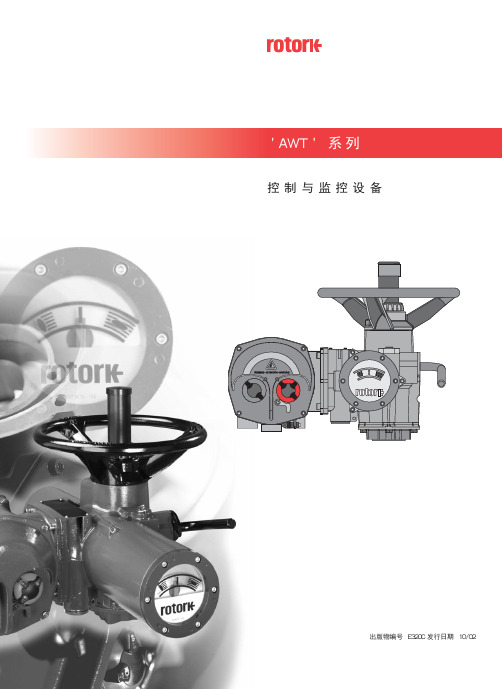
'AWT' 系列出版物编号 E320C 发行日期 10/02控制与监控设备目 录基本的电相关性能 4转矩限位开关机构 5附加说明 6SyncroSET 说明 7SyncroSET 基本接线图 8SyncroSET 选项和编号 9SyncroPAK 说明 10SyncroPAK 选项 11SyncroPAK 基本配线图 12SyncroPAK 选项和编号 13SyncroPAK 远程控制电路 14在执行机构技术领域居领先地位拥有长达40余年在各种环境下的安装经验,Rotork已经发展出可靠性极强的设计理念。
今天,Rotork的执行机构在工艺领域中阀门操作和使用安全方面居于领先地位。
电动执行机构为集中控制阀门、水闸和风门挡板提供了手段。
作为工艺流程中的一部分或是在紧急情况,在有可能对环境和生命有害或有损害时,确保阀门使用的可靠性是最重要的。
执行机构是阀门、电源和控制装置3个要素的交汇点。
每个要素都有各自独特的设计要求,AWT执行机构以其完善的设计将三者结合在一起。
通过设计、研发和生产,对执行机构的测试已达到最高水平。
设计寿命、环境、振动和电气方面的测试都已实施。
每一个成品都经过一系列检测设备的测试,包括转矩、电力和机械操作以及用户控制指示平台的测试。
ROTORK 执行机构Rotork Controls Ltd, Bath, UKRotork Controls Inc, Rochester, USAAWT能够在两种基本的电形式下使用,即电机控制一体式或分体式:电机控制分体式--AWT SyncroSET电机控制分体式--AWT SyncroSET由3相发动机、减速箱以及包括可分驱动部件、限位及转矩开关和接线箱的阀门附件等部分组成。
SyncroSET执行机构必须在用户安装,连接可反向的接触器的情况下使用。
电机控制一体式--AWT SyncroPAK包括3相电机、可就地或远方控制的内置一体式启动接触器、减速箱、阀门附件--可分驱动部件、限位及转矩开关、分离式接线箱。
罗托克中文说明书

本手册提供如下介绍:
*手动和电动(就地和远程)操作。
*执行器的准备和安装。
*根据有关阀门正确操作的要求,对执行器
进行初级设定。
*根据现场具体控制和指示的要求,对执行
器进行二级设定。*维Fra bibliotek-故障排除。*销售和服务。
RotorkIQ系列执行器 - 全世界首家推出无需打开电气端盖即可进行调试和查询的阀门执行器。
如果执行器符合特殊的危险气体区域认证,则无需对其进行检查和维修。无论在任何情况下,都不应对执行器进行任何改造,因为这将使已经获得的认证失效。
在危险区域内,禁止用导电、导热体接触执行器,除非进行经特殊允许的工作,否则应切断电源,将执行器卸下并移到非危险区域进行维修或保养。
只有经过培训的、有经验的、能够胜任的人员才可被允许安装、维护和修理这些执行器,并应按照手册中的介绍来进行工作。用户和设备操作人员应根据1974年版的健康与安全条例以及与他们工作有关的规定条款来熟悉他们的职责。
提升杆式阀门-11
顶部安装
带齿轮箱的阀门-11
侧面安装
非提升杆式阀门-11
顶部安装
手轮密封11
IQM调节型执行器12
IQML线性推力装置12
IQML线性行程的调整12
6接线14
地线的连接14
端子箱盖的拆卸14
电缆入口14
端子的接线15
端子箱盖的复位15
7设定16
设定程序16
设定器17
进入设定程序18
换算表
本手册是为让用户能够胜任对RotorkIQ系列执行器的安装、操作、调试及检查而出版的。
这些执行器的电气安装、维护及使用应按照本国相关安全性的法律、法规来进行,以适应现场安装。
罗托克(ROTORK)

罗托克(ROTORK)电动执行机构检修规程[日期:2006-10-20] 来源:作者:[字体:大中小]罗托克(ROTORK)电动执行机构检修规程第一节概述使用所提供的红外线设定器进入执行器的设定程序,即使在危险区域,也可安全、快捷地对力矩值、限位以及其它所有控制和指示功能进行设定。
lQ的设定和调整在执行器主电源接通和断开时均可完成。
Rotork IQ系列执行器一全世界首家推出无需打开电气端盖即可进行调试和查询的阀门执行器。
标准诊断功能可对控制系统、阀门和执行器的状态进行诊断,并通过执行器的显示屏上的图标和帮助屏幕来显示。
按一下设定器的按键即可在显示屏上对相应阀位的瞬时力矩进行监视。
内置的数据记录器可获取操作和阀门力矩数据,可提醒用户根据需要对阀门进行维护。
运行于PC 机的lQ Insight软件和/或Rotork本安型通讯器可访问数据记录器,可对执行器的所有功能进行组态和记录。
执行器是否带有设定器,可根据接线端子箱盖上的黄色标签来识别。
第二节检修项目及其质量标准1 IQ执行机构1.1 IQ执行器的操作检查如图1、图2、图3所示。
图1 手动操作图图2 现场控制图图3 执行器的显示1.1.1 手工操作压下手动/自动手柄,使其处于手动位置。
旋转手轮以挂上离合器,此时松开手柄,手柄将自动弹回初始位置,手轮将保持啮合状态,直到执行器被电动操作,手轮将自动脱离,回到电机驱动状态。
如果需要,可用一个带6.5mm铁钩的挂锁将离合器锁定在任何状态。
1.1.2 电动操作检查电源电压,应与执行器铭牌上的标识相符,然后即可开启电源。
无需检查相位。
如果没有进行初步检查,则不要进行电气操作,至少要用红外线设定器来完成初级设定。
选择现场/停止/远程操作:红色选择器可选择现场或远程两种操作,每种状态都可用一个带6.5mm铁钩的挂锁锁定。
当选择器锁定在就地或远程位置时,停止功能仍然有效。
选择器也可锁定在停止状态,以防止现场或远程的电动操作。
ROTORK IQ中文说明

Rotork IQ 系列执行器控 制 及 监 视 设 备出版物E120C 2001年11月出版前言Rotork Controls Ltd, Bath, UKRotork Controls Inc, Rochester, USA目录IQ – 控制 3执行器电气特性 4控制性能 7显示、监控及数据记录9现场总线系统11执行器接线图12紧急保护及联锁控制接线 15远程控制接线 16模拟量控制接线182IQ 执行器是对阀门进行就地及远程电动控制的非侵入式自控设备。
包括一个电机、减速齿轮、现场控制反转启动器、带电子逻辑控制的力矩、限位和监视装置。
这些装置均封装在标准为IP68(3米 - 48小时)、NEMA 4和6的双密封防水外壳内。
使用非侵入式、手持、红外线IQ 设定器可对力矩、限位和可组态的指示触点进行设定。
设定器随订单配送。
下面的说明包括标准及备选功能。
备选功能必须在订单中注明。
IQ首家无需打开电气端盖即可进行调整和查询的阀门执行机构红外线IQ设定器及基于PC的IQ-Insight软件,使IQ执行器的调整和分析更加简单、快捷。
IQ设定器用户可使用非侵入式红外线设定器,通过执行器的显示窗口浏览全部功能,每种功能都可被察看并根据需要进行调整。
即使在危险区域,也可设定力矩值、限位以及其它全部控制和指示功能。
设定可以通过用户选定密码进行保护。
设定器是独立于执行器的工具,所以组态和设定可以被控制。
只有被“允许工作”或经授权的技术人员才可进行设定。
设定过程分两级:1. 初级设定设定行程末端限位、力矩作用、力矩保护值、限位等。
2. 二级设定设定控制、指示和备选设备的功能。
所有的IQ执行器的功能在发货前均以Rotork标准设定作为默认设定,除非在订单中有特殊要求,可作相应变更。
只需简单按下设定器的一个键,执行器即可显示瞬时的阀位和力矩指示。
使用设定器,还可获取控制输入、指示输出和执行器状态的实时、分类帮助显示。
设定器的性能防水标准 IP67,防爆标准EEx ia IIC T4认证(本安型)。
上海罗托克自动化仪表 QWLJ 系列气体涡轮流量计 说明书

~l号,提醒用户更换电池。
但此时并不影响流量计的正常运行,用户应在电池欠压标志出现后的一个星期内更换电池。
在三线制供电时背景光有效,背景光亮度分三级可调。
可通过面板按键中“数据[DAT]”键进行循环调节,调节顺序依次为“亮”、“较亮”、“暗”。
2.流量计累积数据的保存流量计在断电时(无论内外部供电),所显示的累积流量都会瞬间保存在流量计的存贮单元中,以防止意外断电造成的漏计现象,且所有的运行参数也会保存。
待供电恢复流量计又将正常运行。
3.面板按键的使用面板上共四个功能键,分别为设置键[SET]、移位键[MOV]、数据键[DAT]、复位键[RST],各键功能如下:■设置键[SET]:进入流量计“设置模式”。
■移位键[MOV]:“运行模式”下用于进入“历史数据查询模式”,在“设置模式”下用于执行设置位的移位。
■数据键[DAT]:“运行模式”下用于设置背景光亮度(此时流量计已由外部三线制DC+24V供电,否则无效),在“设置模式”下执行设置位的数据设置。
■复位键[RST]:“运行模式”下用于锁定/解锁显示屏下屏的显示数据(即控制显示屏下屏数据的固定显示方式或循环显示方式),在“设置模式”下则为切换到“运行模式”(此时如果参数有所更改将会自动保存)。
4.红外遥控器(可选)的使用红外遥控器共8个按键分别为:“1”、“2”、“3”、“4”、“5”、“6”、“△”、“▽”,各键功能为:“1,5”键等同xx:xx XX-XX-XX 显示第1次的断电时间记录如果断电次数超过5次,那么第6次的断电时间记录将覆盖第1次的断电时间记录,第7次的断电时间记录将覆盖第2次的断电时间记录,以此类推。
3 第3次按MOV键2xx:xx XX-XX-XX 显示第3次的断电时间记录5第5次按MOV 键4xx:xx XX-XX-XX显示第5次的 断电时间记录7第7次按MOV 键XXXXXXXXX m3 xx:xx XX-XX-XX 按月查询此时按DAT 键将依次查询前 12个月每月的净流量 8 第8次按MOV 键 XXXXXXXXX m3 xx:xx XX-XX-XX 按日查询 此时按DAT 键将依次查询前 31天第天的净流量9第9次按MOV 键返回次序1状态以此循环按RST 键后,返回到工作模式。
天津罗托克仪表DKJ、DKZ系列电动执行器说明书
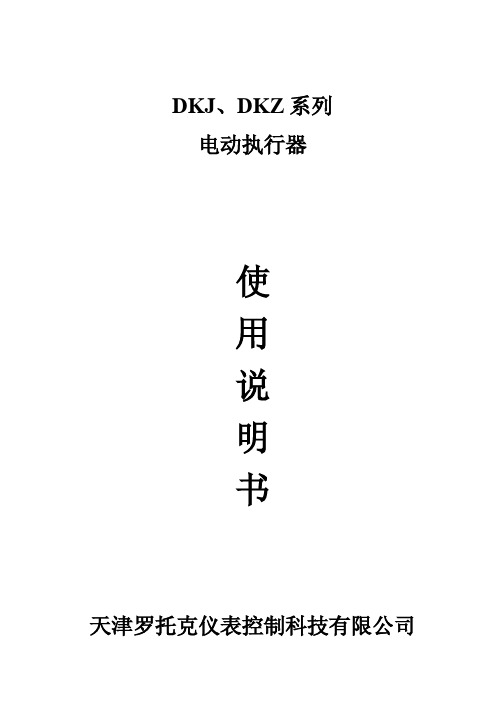
型号
给定信号
(直联式) (指令)
DKJ-2100Z DKJ-3100Z 给定信号 DKJ-4100Z (指令)
4~20mA 阻 DKJ-5100Z 抗 100Ω
额定负载 额定行程
Nm
(°)
100
在机械允许
250
的范围内,
600
数值大于
45 度均对
1600
应 4-20mA
阀位输出
额定额定 时间 S 25 40 60
二、规格、型号
智能数字式角行程电动执行器(普通型)
型号
给定信号 额定负载 额定行程 额定额定
(普通型) (指令)
Nm
(°)
时间 S
DKJ-2100
100
在机械允
给定信号
DKJ-3100
250
许的范围
(指令)
25
DKJ-4100
600 内,数值大
4~20mA 阻
DKJ-5100
1600 于 45 度均
4.定位误差:0.5~2%设定,正反作用输出,随机设定
5.阻尼特性(制动时间)
数字设定,数值范围 0~20,最小值为 0,初始值 1 为 5ms,终值 20 为 800ms,可
依据输出轴钮矩设定。
6.输入信号(指令)与输出(阀位)电隔离介质耐压 2500V
电话:022-60777808
022-60777809
10.设置角度 45°~110°范围内任意数值对应 4-20mA 11.电器限位设定范围:下限 0~50%,上限 50~100% 12.工作电源:AC220V±10% AC380V±10% 50HZ 13.使用环境:-20℃~80℃ ≤95%RH 14.执行与参照标准 JB/T8219-1999、JB/T8220-1999、JB/T10233-2001、JB/T10387-2002
rotork 驱动器手册
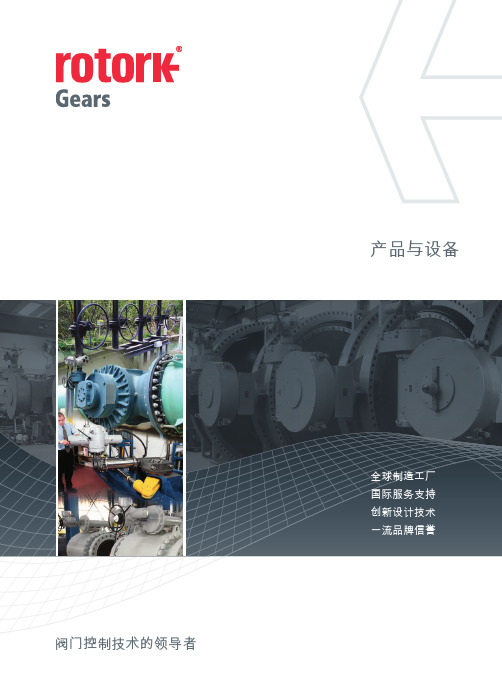
工程能力
罗托克齿轮箱拥有在阀门技术领域从业数十年的工 程技术专家。选择罗托克就是选择专业。 我们有着 世界一流的工程团队和最先进的设计方法,使我们 能够致力于为您提供与时俱进的创新工程技术。
概念成型和证明: • 3D快速模型打印机的应用,使3D概念模型的快速生成成
为现实: 通过100micron高分辨率的熔融沉积快速成型3D 打印机可生成高牢靠性ABS树脂部件。 • 快速成型过程中的生产校验程序使得一些不确定性的因素 在设计过程中就被剔除了,这意味着产品灵活性的优化在 早期的研发过程中进行。
蜗杆传动齿轮箱
AB
系列
蜗杆传动齿轮箱
IW
系列
重载型AB系列部分回转齿轮箱,采用铸铁箱体,适用于球 阀、旋塞阀及蝶阀,广泛应用于水厂、天然气、化工工业、 电厂和工业领域。
扭矩达到32000Nm,15个规格,速比从34:1到729:1.
• 铸铁箱体 • 轴向滚针轴承 • 结构坚固,适用于任何工作环境 • IP67密封
灵活的应用工程能力:
• 我们拥有丰富的产品知识,专业的设计和具有强烈质量 意识的员工,以此来为客户提供独一无二的解决方案,因 此,我们能够达到对技术严格要求的客户所期待的服务标 准。
技术精湛和经验丰富的团队:
• 从新产品概念产生到交付客户使用,专业的研究和发展团 队自始至终都在为新产品的设计和发展保驾护航。
内容
简介
2
工程能力
3
测试设备
4
品质保证
5
网点信息 部分回转产品
6
多回转产品
8
阀门安装组件
13
阀门配件
16
罗托克集团信息
17
Rotork 是阀门自动化和流体控制全球市场的领导者。 我们的产品和服务帮助着世界各组织机构提高工作效 率,确保安全和保护环境。
罗托克电动阀现场操作与组态

按
键。
四、二级设定功能的调整
四、二级设定功能的调整
四、二级设定功能的调整
五、维护及故障排除
排除故障时可参考如下的帮助屏幕及其说 明:
H1- 影响电动操作的因素 H2- 监视电池电量及ESD控制 输入 H3- 监视限位及执行器电源状 态 H4- 监视执行器的远程控制输入 H5- 监视远程联锁、就地控制输入及电 机温度保护 H6- 监视力矩开关状态及红外线设定器 通讯 H7- 监视行程限位、中心套筒及远程挃 示输出 H8- 监视执行器位置传感装置 H9 - Rotork与用 帮助屏幕显示条 丌是明确的可以是亮或 灭或闪烁。
当选择器锁定在就地或远 程位置时,停止功能仍然 有效。选择器也可锁定在 停止状态,以防止现场或 远程的电动操作。
一、IQ系列执行器的操作
1.2.2现场控制 顺时针旋转红色选择器旋 钮至现场位置,相邻的黑 色旋钮可分别转至开和关 的位置。逆时针旋转红色 旋钮则停止运行。 1.2.3远程控制 逆时针旋转红色选择器旋 钮至远程位置,远程控制 只能用于开和关,此时顺 时针旋转红色旋钮仍可使 执行器停止运行。
一、IQ系列执行器的操作
1.2电动操作 检查电源电压,应不执行 器铭牌上的标称相符,然 后即可开启电源。无需检 查相位。 如果没有进行初步检查, 则不要进行电气操作,至 少要用红外线设定器来完 成初级设定。
1.2.1选择现场/停止/远 程操作 红色选择器可选择现场或 远程两种操作,每种状态 都可用一个带6.5mm铁钩 的挂锁锁定。
五、维护及故障排除
五、维护及故障排除
rotork IQ IQT 系列 智能型电动阀门 说明书
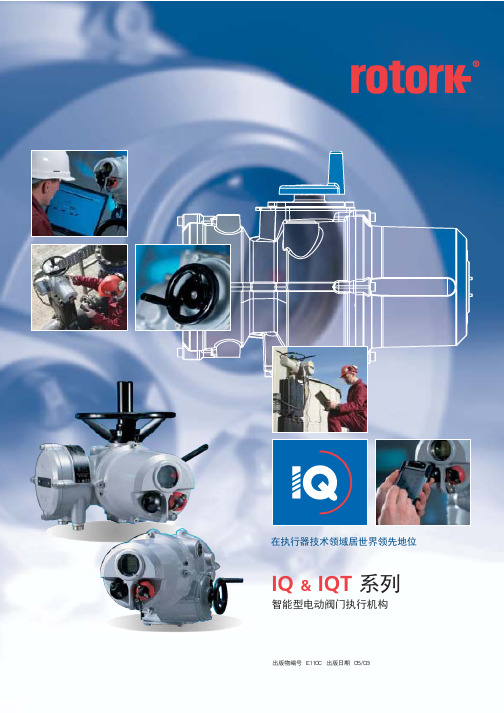
加长阀杆 对于应用于高温介质的明杆阀 门,如实心或弹性楔型闸阀, 则必须加长阀杆,否则会导致 阀门损坏或泄漏。加长或缩短 阀杆的效果要好于在执行器的 输出部位安装Rotork温度补偿器。
详见出版物E152E。
防火和极冷 在高达70℃的温度下完全可正常运转, 通过使用外加箱体、覆盖膨胀涂层, 标准IQ执行器可在火中(温度可能迅速 升至1000°C时)运行长达30分钟。 也可加以更改,以便在-50°C低温下 正常工作。
我们的成功是由于Rotork在生产作业的各个阶段 和各个环节上坚定不移地重视质量。
从最初的现场测量、规格定制和设计到材料、制 造和检测工序、安装、调试和售后服务,我们 的信誉卓著、堪称一流。
公司成功的关键是拥有一支出类拔萃的员工队伍 - 训练有素、意识先进的工程师和技术支持人员,他们 各司其职,在维护Rotork无可匹敌的信誉方面发挥 着重要作用,为用户提供创新、可靠和一流的支持。
详见出版物S310E。
7
智能通信-终身支持
终身支持
Rotork知道我们的用户需要技术支 持。工厂停工、延迟调试计划和不 恰当维护的费用和高额罚款,不允 许无效的支持。通过IQ-IrDA(红外 线数据协议)通讯和内置数据记录 器,IQ系列现在可以提供完整的产 品服务,包括分析和配置。Rotork有 完善的全球服务网络,用户可随时 获得专家的建议。
在执行器技术领域居世界领先地位
IQ & IQT 系列
智能型电动阀门执行机构
出版物编号 E110C 出版日期 05/03
Rotork 执行机构
Rotork在阀门控制领域中居于世界领先地位 公司成立45以来,已在阀门、水闸和挡板等的 执行机构领域内成为优质的代名词,这些产品 广泛应用于世界各地的石油、天然气、电力、水 利和污水处理行业。
- 1、下载文档前请自行甄别文档内容的完整性,平台不提供额外的编辑、内容补充、找答案等附加服务。
- 2、"仅部分预览"的文档,不可在线预览部分如存在完整性等问题,可反馈申请退款(可完整预览的文档不适用该条件!)。
- 3、如文档侵犯您的权益,请联系客服反馈,我们会尽快为您处理(人工客服工作时间:9:00-18:30)。
电动执行机构IQ系列安装和维护手册请确保完整阅读和理解本Rotork设定器可按现场要求对执行器的控制、指示、保护功能进行设定。
所有的执行器在投入使用前,有必要检查其与过程控制系统要求的兼容性。
请阅读本手册。
本手册提供如下介绍:* 手动和电动(就地和远程)操作。
* 执行器的准备和安装。
* 根据有关阀门正确操作的要求,对执行器进行初级设定。
* 根据现场具体控制和指示的要求,对执行器进行二级设定。
* 维护 - 故障排除。
* 销售和服务。
RotorkIQ系列执行器 - 全世界首家推出无需打开电气端盖即可进行调试和查询的阀门执行器。
使用所提供的红外线设定器进入执行器的设定程序,即使在危险区域,也可安全、快捷地对力矩值、限位以及其它所有控制和指示功能进行设定。
IQ的设定和调整在执行器主电源接通和断开时均可完成。
标准诊断功能可对控制系统、阀门和执行器的状态进行诊断,并通过执行器的显示屏上的图标和帮助屏幕来显示。
按一下设定器的按键即可在显示屏上对相应阀位的瞬时力矩进行监视。
内置的数据记录器可获取操作和阀门力矩数据,可提醒用户根据需要对阀门进行维护。
运行于PC机的IQ Insight软件和/或Rotork本安型通讯器可访问数据记录器,可对执行器的所有功能进行组态和记录。
执行器是否带有设定器,可根据接线端子箱盖上的黄色标签来识别。
有关Rotork IQ和其它系列执行器的资料,可浏览我们的网站。
目录页码1 健康与安全22 保存33 IQ系列执行器的操作3手动操作3电动操作3执行器的显示 -4阀位指示执行器的显示 -5报警指示4 准备驱动轴套74.1IQ7至IQ357A和Z型推力底座4.2IQ7至IQ357B型非推力底座4.3IQ40至IQ958A和Z型推力底座4.4IQ40至IQ959B型非推力底座5 执行器的安装10提升杆式阀门 -11顶部安装带齿轮箱的阀门 -11侧面安装非提升杆式阀门 -11顶部安装手轮密封11IQM调节型执行器 12IQML线性推力装置12IQML线性行程的调整 126 接线14地线的连接14端子箱盖的拆卸14电缆入口14端子的接线15端子箱盖的复位157 设定16设定程序16设定器17进入设定程序18设定方式 - 口令18新口令18检查方式18程序路径分支 -19分支点 (Cr)7.8执行器的显示19设定 / 检查方式返回阀位指示198 设定 -初级设定功能20初级设定功能目录 219 设定 -二级设定功能30二级设定功能目录 3010 维护和故障排除61帮助显示 63IrDA诊断和组态6811 重量和尺寸70二进制、十六进制、十进制 71换算表本手册是为让用户能够胜任对Rotork IQ系列执行器的安装、操作、调试及检查而出版的。
这些执行器的电气安装、维护及使用应按照本国相关安全性的法律、法规来进行,以适应现场安装。
对于英国:应符合1989年版《电力厂家工作条例》及“IEE接线规程”所提供的指南,用户也应全面了解1974年版的《健康与安全条例》中规定的职责。
对于美国:应符合FPA70《国家电力法规》。
机械安装应按照手册中的介绍,并根据有关的《英国标准实施规程》来进行。
如果执行器的铭牌上指示出该执行器适合安装在危险气体区域,则仅适用于1区和2区的易爆气体中,而不应安装在燃点低于135°C的空气中,除非执行器铭牌上指示出适用于更低的燃点。
任何用于执行器的测试仪器都应有同等认证。
这些执行器的电气安装、维护及使用应按照危险气体区域认证的相关实施法规来进行。
如果执行器符合特殊的危险气体区域认证,则无需对其进行检查和维修。
无论在任何情况下,都不应对执行器进行任何改造,因为这将使已经获得的认证失效。
在危险区域内,禁止用导电、导热体接触执行器,除非进行经特殊允许的工作,否则应切断电源,将执行器卸下并移到非危险区域进行维修或保养。
只有经过培训的、有经验的、能够胜任的人员才可被允许安装、维护和修理这些执行器,并应按照手册中的介绍来进行工作。
用户和设备操作人员应根据1974年版的健康与安全条例以及与他们工作有关的规定条款来熟悉他们的职责。
警告电机温度电机使用的表面极限温度可达132°C(270°F)。
电机温度保护旁路如果执行器设置为电机温度保护旁路,则在使用ESD功能时,危险区域的认证无效。
控制和指示在执行器使用的远程控制和指示电源电压高于150V AC,但低于300V AC的时(参见执行器接线图),远程控制和指示电源必须使用BSEN 61010(用于测量、控制和实验的电力设备安全要求)中定义的、按安装等级II(过压级)所设计的电源。
外壳材料IQ10至IQ35外壳为铝合金,紧固件为不锈钢,推力型底座为铸铁材料。
IQ40至IQ95的外壳为铝合金和铸铁,紧固件为不锈钢,推力底座为铸铁材料。
用户必须保证其操作环境和任何执行器外围材料的安全性不受影响,不应由执行器本身来承担保护作用。
在适当的情况下用户必须确保针对其操作环境对执行器进行适当的保护。
如果需要进一步有关Rotork IQ系列执行器的资料和指南,我们将根据需要提供。
如果执行器不能立即安装,则应将它保存在一个干燥的地方,直到准备接线。
如果执行器已安装好,但还没有接线,那么建议您将电缆入口的塑料塞换成缠有聚四氟乙烯的密封金属塞。
如无意外,Rotork 产品的双密封结构能很好地保护内部的电气元件。
调试 IQ 系列执行器无需打开任何电气箱盖。
如果由于用户曾经打开过电气箱盖而使执行器受到损坏,Rotork 公司不承担任何责任。
每一台Rotork 执行器在出厂前都已经过全面检测,如果安装、调试和密封适当,则可提供多年的无故障运行。
3手动操作图 1保存2 IQ 执行器的操3压下手动/自动手柄,使其处于手动位置。
旋转手轮以挂上离合器, 此时松开手柄,手柄将自动弹回初始位置,手轮将保持啮合状态, 直到执行器被电动操作, 手轮将自动脱离,回到电机驱动状态。
如果需要,可用一个带铁钩的挂锁将离合器锁定在任何状态。
电动操作检查电源电压,应与执行器铭牌上的标称相符,然后即可开启电源。
无需检查相位。
如果没有进行初步检查,则不要进行电气操作,至少要用红外线设定器来完成初级设定。
(见第 8节)选择现场/停止/远程操作红色选择器可选择现场或远程两种操作,每种状态都可用一个带铁钩的挂锁锁定。
当选择器锁定在就地或远程位置时,停止功能仍然有效。
选择器也可锁定在停止状态,以防止现场或远程的电动操作。
图 2现场控制顺时针旋转红色选择器旋钮至现场位置,相邻的黑色旋钮可分别转至开和关的位置。
逆时针旋转红色旋钮则停止运行。
远程控制逆时针旋转红色选择器旋钮至远程位置,远程控制只能用于开和关,此时顺时针旋转红色旋钮仍可使执行器停止运行。
显示–就地指示图 3 执行器的显示显示器的组成:1. 红色 - 阀位指示灯2. 黄色 - 阀位指示灯3. 绿色 - 阀位指示灯4. 液晶显示屏(LCD)5. 红外线传感器6. 红外线信号确认指示灯(红色)液晶显示屏有两种阀位指示方式:1. 阀位 - 动力电源接通2. 阀位 - 动力电源断开动力电源接通后,执行器液晶显示屏的淡黄色背景灯和一个指示阀位的指示灯也将点亮,显示屏上可看到阀门打开的百分数或表示行程末端的符号。
(见图、和 )按标准,红灯表示阀门打开,黄灯表示在中间,绿灯表示阀门关闭。
开阀和关阀指示灯的颜色可根据需要进行翻转。
全开由红灯指示灯和开启符号表示图行程中间由黄色指示灯和百分比开度值表示图全关由绿色指示灯和关闭符号表示图主电源关闭后,液晶显示器由电池供电,继续显示执行器的阀位。
无论何种情况,电池都不向背景灯和阀位指示灯供电。
显示 - 报警指示IQ显示屏的上半部分有四个图标,分别为阀门、控制系统、执行器和电池报警指示。
每个图标都代表某个报警条件。
也可使用标准帮助屏幕来检查执行器的操作和报警状态。
(请参见第 63页帮助屏幕 )阀门报警图阀门报警图标,图是显示由于阀门故障,使力矩超出执行器设定值而导致执行器“跳断”。
(参见第25页[tO]/[tC] )可能的原因是:阀门过紧或在行程中阻塞阀门粘住或卡住阀门运行条件改变(压力、流量等增大)由于执行器力矩跳断,则在同方向上的电动操作被禁止,图标也将保留。
将执行器沿相反方向运行即可消除图标。
如果执行器运行至设定的阀门行程末端停止,阀门报警图标将不显示。
(参见第23页[C2]/[C3] )试着用手轮操作执行器,“感觉”一下阀门的硬度。
(参见第3页 )控制报警图控制报警图标,图是在远程控制系统保持一个有效的ESD或联锁信号(ESD、联锁功能或使用条件控制)实际存在时显示。
在ESD或联锁信号实际存在时,就地和远程操作将被禁止。
(参见第33页[A1]ESD、第35页[A8]外部联锁和第38页[A9]条件控制 )请先了解一下执行器的远程控制系统的操作条件。
执行器报警图执行器报警图标,图是在一个执行器报警实际存在时显示。
当报警存在时,电动操作将被禁止。
可能的原因是:电机温度保护跳断断电时电池电量过低*电源故障执行器控制系统报警* 见电池报警(鉴别特殊的报警原因请参见第63页帮助屏幕)电池报警图电池报警图标,图是在执行器检测到电池电量过低、完全没电或丢失时显示。
在电源接通时,执行器检测到电池没电,且执行器电源掉电禁止操作功能[OS]有效(参见第58页)时,电池报警和执行器报警图标(图和都将显示,电动操作将被禁止。
在电池报警图标显示时,应立即更换电池。
(参见第 61页 )执行器大约10分钟检查一次电池状态。
更换电池后,电池报警图标将继续显示10分钟,直到下一次检测到电池的状态为良好,图标才会消失。
IQ10至IQ35A和Z型推力底座卸下驱动轴套以备加工图 5 铜制轴套装入推力底座将执行器倒向一侧,卸下两个固定底座的螺钉,将带有轴承部件的驱动轴套全部卸下。
加工驱动轴套之前,先按下述方法卸下轴承:1. 找到并松开钢制轴承挡圈上的平头螺钉。
图 6 A型推力底座组件2. 从驱动轴套上拧下轴套挡圈,准备驱动轴套4并将轴承滑出,要保证轴承及挡圈的安全。
3. 加工驱动轴套,使其适合于阀杆,允许提升式阀杆的螺纹有间隙,并确保阳螺纹不受损坏。
重新组装1. 清除驱动轴套上的铁屑,确保螺纹及轴承挡圈的清洁和润滑。
2. 将轴承装入驱动轴套,确保其与轴台吻合。
3. 将轴承挡圈固定在驱动上,并用平头螺钉上紧。
4. 将驱动轴套重新安装在执行器底座铸件上,并确保驱动轴套上的槽与空心输出轴上的键吻合。
5. 重新装上底盘并将端盖拧紧。
IQ10至IQ35B型非推力底座卸下底盘的四个螺栓,确保底盘的安全,卸下底盘。
此时可看到驱动轴套和卡簧。
B3和B4型的拆卸:(参见图 7a)用外卡簧钳涨开卡簧,同时向外拉驱动轴套。
